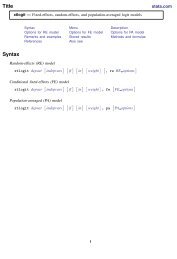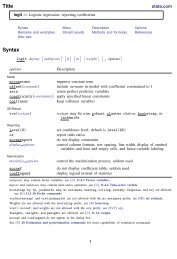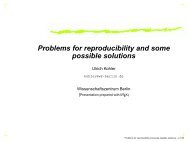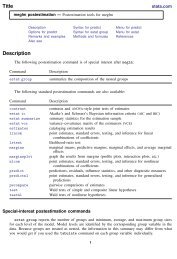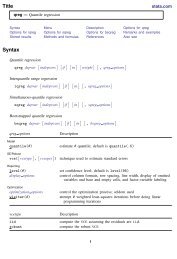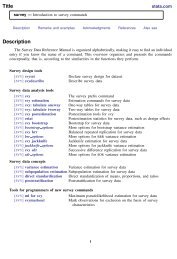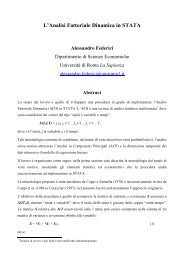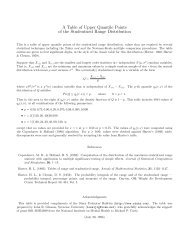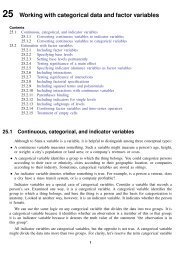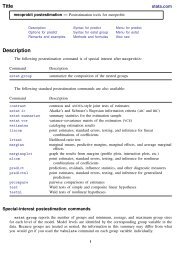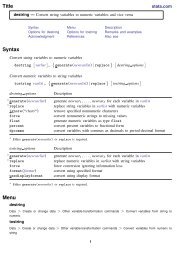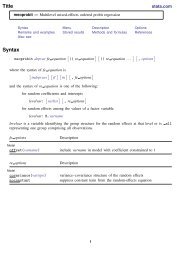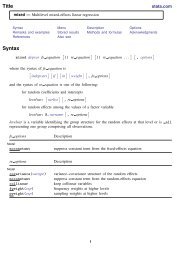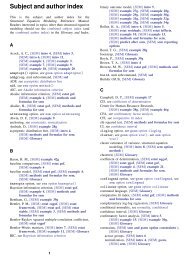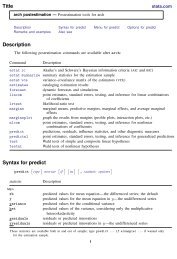[SEM] gsem - Stata
[SEM] gsem - Stata
[SEM] gsem - Stata
You also want an ePaper? Increase the reach of your titles
YUMPU automatically turns print PDFs into web optimized ePapers that Google loves.
Default covariance assumptions<br />
<strong>gsem</strong> — Generalized structural equation model estimation command 3<br />
<strong>gsem</strong> assumes the same covariance structures as does sem; see [<strong>SEM</strong>] sem and see [<strong>SEM</strong>] intro 4.<br />
<strong>gsem</strong>, however, treats covariances between observed exogenous variables as given. Actually, so does<br />
sem unless you specify an override. The override cannot be specified with <strong>gsem</strong>.<br />
How to solve convergence problems<br />
See [<strong>SEM</strong>] intro 12.<br />
Stored results<br />
<strong>gsem</strong> stores the following in e():<br />
Scalars<br />
e(N)<br />
number of observations<br />
e(N clust)<br />
number of clusters<br />
e(k)<br />
number of parameters<br />
e(k cat#)<br />
number of categories for the #th depvar, ordinal<br />
e(k dv)<br />
number of dependent variables<br />
e(k eq)<br />
number of equations in e(b)<br />
e(k out#)<br />
number of outcomes for the #th depvar, mlogit<br />
e(k rc)<br />
number of covariances<br />
e(k rs)<br />
number of variances<br />
e(ll)<br />
log likelihood<br />
e(n quad)<br />
number of integration points<br />
e(rank)<br />
rank of e(V)<br />
e(ic)<br />
number of iterations<br />
e(rc)<br />
return code<br />
e(converged)<br />
1 if target model converged, 0 otherwise<br />
Macros<br />
e(cmd)<br />
<strong>gsem</strong><br />
e(cmdline)<br />
command as typed<br />
e(depvar)<br />
names of dependent variables<br />
e(title)<br />
title in estimation output<br />
e(clustvar)<br />
name of cluster variable<br />
e(family#)<br />
family for the #th depvar<br />
e(link#)<br />
link for the #th depvar<br />
e(offset#)<br />
offset for the #th depvar<br />
e(intmethod)<br />
integration method<br />
e(vce)<br />
vcetype specified in vce()<br />
e(vcetype)<br />
title used to label Std. Err.<br />
e(opt)<br />
type of optimization<br />
e(which)<br />
max or min; whether optimizer is to perform maximization or minimization<br />
e(method)<br />
estimation method: ml<br />
e(ml method)<br />
type of ml method<br />
e(user)<br />
name of likelihood-evaluator program<br />
e(technique)<br />
maximization technique<br />
e(datasignature) the checksum<br />
e(datasignaturevars) variables used in calculation of checksum<br />
e(properties)<br />
b V<br />
e(estat cmd)<br />
program used to implement estat<br />
e(predict)<br />
program used to implement predict<br />
e(covariates)<br />
list of covariates<br />
e(footnote)<br />
program used to implement the footnote display<br />
e(marginsnotok) predictions not allowed by margins


![[SEM] gsem - Stata](https://img.yumpu.com/26645645/3/500x640/sem-gsem-stata.jpg)
